|
|
|
Sort Order |
|
|
|
Items / Page
|
|
|
|
|
|
|
| Srl | Item |
| 1 |
ID:
106670
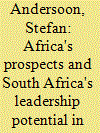

|
|
|
|
|
| Publication |
2011.
|
| Summary/Abstract |
This article examines Africa's role in an evolving international system where powerful emerging markets, such as bric, together with established powers are shaping economic trajectories. The specific focus is on South Africa as an aspiring leader on the African continent, and on its potential for becoming an emerging market shaping the global order together with bric and the West. It is unclear whether a changing global economy in which the postcolonial world plays a greater role will result in improved developmental prospects for Africans as African countries gradually reorient themselves from the West to the South, or whether relations with emerging markets will resemble neo-colonial ties with the West. South Africa's structural weakness, stemming from serious domestic problems of a social, political and economic nature, threatens to undermine its standing in Africa and its emerging market status.
|
|
|
|
|
|
|
|
|
|
|
|
|
|
|
|
| 2 |
ID:
128476
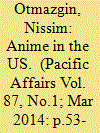

|
|
|
|
|
| Publication |
2014.
|
| Summary/Abstract |
In the past two decades, the enthusiastic global reception of Japanese cultural exports has drawn wide academic attention. In the case of Japanese animation ("anime"), its penetration into the United States, the world's biggest media market, has been described as owing greatly to the crucial role of fans as cultural agents, the deterritorializing effects of globalization, the domestication and heavy editing of anime to suit local tastes, and being part of the wider global flow of Japanese pop culture and "soft power." Drawing on interviews with Japanese and American key personnel in the anime industry, field research and market surveys, this paper focuses on the organizational aspect of the anime market in the United States since the mid-1990s, with particular attention to the role of entrepreneurs, who are imperative for bridging organizational rigidities and cultural differences in global markets. The central argument presented is that entrepreneurship is a central feature in the process of transnational penetration, distribution, reproduction and consumption of cultural commodities and genres, which produce ever more complex and disjunctive economic, cultural and political orders.
|
|
|
|
|
|
|
|
|
|
|
|
|
|
|
|
| 3 |
ID:
101748
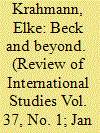

|
|
|
|
|
| Publication |
2011.
|
| Summary/Abstract |
Expanding on the works of Beck and others on the growing business of risk, this article examines the role of the private security industry in the creation, management and perpetuation of the world risk society. It observes that the replacement of the concept of security with risk over the past decades has permitted private firms to identify a growing range of unknown and unknown-unknown dangers which cannot be eliminated, but require permanent risk management. Using the discourse of risk and its strategies of commercialised, individualised and reactive risk management, the private risk industry thus has contributed to the rise of a world risk society in which the demand for security can never be satisfied and guarantees continuous profits.
|
|
|
|
|
|
|
|
|
|
|
|
|
|
|
|
| 4 |
ID:
148948
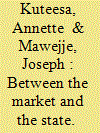

|
|
|
|
|
| Summary/Abstract |
This study assesses the capabilities of business associations for conducting meaningful policy engagements with government. Using information from 21 associations and five state institutions, this work investigates the level of autonomy and ability of business associations to coordinate and order their interests for policy decision-making. Findings reveal that the ability to organise an association's own interests is hindered by weak systems and internal structures, especially at sub-sector level. Most associations are financially weak, have limited professional expertise and experience a low level of commitment from members, which affects their capacity for autonomy. It is important that business associations create regulations to make membership ties binding, so as to strengthen their influence on policy. Associations should also be more aggressive in mobilising finances, and they should identify synergies and develop partnerships with the state to build their capacity for participating in policy-making.
|
|
|
|
|
|
|
|
|
|
|
|
|
|
|
|
| 5 |
ID:
169798
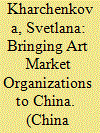

|
|
|
|
|
| Summary/Abstract |
This study proposes a new explanation for institutional differences of organizations in China. It focuses on how two organizational forms dominant in contemporary art markets – commercial galleries and auction houses – were first established in China in the 1990s. Based on archival and interview data, it argues that the organizational forms were introduced to China due to mimetic isomorphism, and that their divergences from the foreign models are the result of unintended consequences of institutional work. It highlights the role of individual agency, including the role of foreign nationals, in organization-building in China. The findings also have implications for institutional theory: the article shows how the political, cultural and institutional context in China shaped institutional work that needed to be conducted and led to unintended consequences of institutional work.
|
|
|
|
|
|
|
|
|
|
|
|
|
|
|
|
| 6 |
ID:
109361


|
|
|
|
|
| Publication |
2011.
|
| Summary/Abstract |
The UK Government plans a capacity mechanism to ensure sufficient reserves as the share of intermittent generation increases. This article reviews the use of last resort capacity mechanisms in two other energy-only markets, Australia and New Zealand.
The Australian National Electricity Market has infrequent price spikes up to A$12,500 (£7800)/MWh. Option contracts have supported significant investment in peak capacity. The system operator also has an ability to contract reserve up to 9 months before projected shortfalls. Reserve has been contracted on two occasions but never dispatched.
The New Zealand electricity market includes a reserve energy scheme which allows the system operator to contract and dispatch reserve capacity. One plant has been contracted under the scheme. The plant is currently offered into the market at NZ$5000 (£2300)/MWh.
In both markets there have been concerns that reserve schemes could reduce the frequency of high prices and damage price signals for peak investment. Following a Ministerial review in 2009 the New Zealand scheme is being closed down and the plant is for sale. The Australian scheme is to be closed down in 2013. This experience raises concerns about the possible impact of a new capacity mechanism in Great Britain.
|
|
|
|
|
|
|
|
|
|
|
|
|
|
|
|
| 7 |
ID:
117179
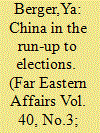

|
|
|
| 8 |
ID:
164059
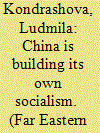

|
|
|
|
|
| Summary/Abstract |
The revolution of 1949 in China marked the country’s transitionfrom “bureaucratic feudalism” to the building of socialist society. The begin-ning of the policy of reforms (1978-1979) is now interpreted as “another rev-olution” – a transition from “state socialism” to “market socialism.” Judgingby the decisions of the 19th CPC Сongress, at present China begins a newstage of socioeconomic development aimed at combining the personal inter-ests of its citizens with public and state interests. The new stage of reforms canbe characterized as the “third Chinese revolution” with very important conse-quences for the entire social structure of the country. The Chinese multilayeredmarket economy will correspond to a mixed political system that features acombination of strong centralized power with party-and-government manage-ment and democratic methods of administration at a lower level.
|
|
|
|
|
|
|
|
|
|
|
|
|
|
|
|
| 9 |
ID:
102099
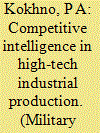

|
|
|
|
|
| Publication |
2010.
|
| Summary/Abstract |
The article shows the need for competitive intelligence (CI) for high-tech enterprises in the defense industry, examines the basic data sources of CI and methods of analyzing information used in competitive intelligence.
|
|
|
|
|
|
|
|
|
|
|
|
|
|
|
|
| 10 |
ID:
128788
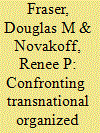

|
|
|
| 11 |
ID:
110111
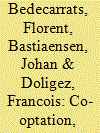

|
|
|
|
|
| Publication |
2012.
|
| Summary/Abstract |
The past decade has been marked by the resurgence of leftist political movements across Latin America. The rise of the 'new left' masks the ambivalent relationships these movements have with broader society, and their struggle to find an alternative to the prevailing development model. Filling the void left by failed public banks, the microfinance sector has grown significantly across the continent in an increasingly commercial form. Analysis of Nicaragua, Ecuador and Bolivia reveals that their new governments share a common distrust of microfinance. Yet, in the absence of viable alternatives for financial service provision, governments and microfinance stakeholders are forced to coexist. The environment in which they do so varies greatly, depending on local political and institutional factors. Some common trends can nevertheless be discerned. Paradoxically, the sector seems to be polarised into two competing approaches which reinforce the most commercially oriented institutions on the one hand, and the most subsidised on the other, gradually eliminating the economically viable microfinance institutions which have tried to strike a balance between social objectives and the market.
|
|
|
|
|
|
|
|
|
|
|
|
|
|
|
|
| 12 |
ID:
099611
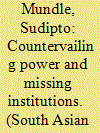

|
|
|
|
|
| Publication |
2010.
|
| Summary/Abstract |
Providing resource security for one group of stakeholders frequently entails loss of a certain degree of resource security for another group of stakeholders. The competing interests of winners and losers, and the 'public good' nature of many resource uses, makes it challenging to provide resource security in a benign and equitable manner. Power relations are key in determining compensation outcomes, and in particular the importance of countervailing power, in the absence of autonomous institutions with regulatory authority. When one group has overwhelming market power, or political power or a combination of the two, that group's interest will drive the outcome, regardless of the technical principles of compensation. The article demonstrates through examples how the dynamics of countervailing power works in the national context and in the global context. It also highlights the usefulness of autonomous institutions with jurisdiction over resource security issues. Institutions can protect the interest of stakeholders who do not have either economic power or political power.
|
|
|
|
|
|
|
|
|
|
|
|
|
|
|
|
| 13 |
ID:
190695


|
|
|
|
|
| Summary/Abstract |
The global economic crisis and the associated economic downturn in Turkey revitalized debates about the theory and politics of the middle classes. The significance of the middle classes has historically been shaped by not only the ‘declining’ boundaries of their objective class position but also their ‘rising’ importance in the reproduction of capital accumulation and hegemonic relations. Inspired by the notion of ‘contradictory class locations’ offered by Erik Olin Wright to make sense of the growing middle class of nonmanual labor in contemporary capitalist societies, and with a particular focus on Turkey’s hardware sector and small traders in the Karaköy region, this article addresses the specific historical conditions of these small traders' class formation and analyzes their experiences with changing market conditions, their approaches to the functioning of market mechanisms, and the role of the state, as well as forms of their political representation.
|
|
|
|
|
|
|
|
|
|
|
|
|
|
|
|
| 14 |
ID:
126998
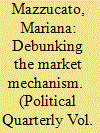

|
|
|
| 15 |
ID:
102100
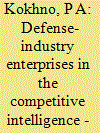

|
|
|
|
|
| Publication |
2010.
|
| Summary/Abstract |
The paper analyzes the economic, political and social factors of the impact from the internal and external environment on the competitiveness of defense-industry enterprises.
|
|
|
|
|
|
|
|
|
|
|
|
|
|
|
|
| 16 |
ID:
085201
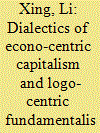

|
|
|
|
|
| Publication |
2008.
|
| Summary/Abstract |
The paper intends to offer a framework of understanding the dual rise of
econo-centric capitalism and logo-centric fundamentalism as a dialectical
process of mutual generation and destruction in the long historical struggles
between ideas and values on the one hand, and material life and society on
the other. "Mutual generation and destruction" implies a dialectical process
in which the deification of the free market and the global expansion of
market capitalism have unavoidably generated mounting contradictions
paving the way for the resurgence of radical counter-hegemonic sociopolitical
forces. It is the analysis of this connection that leads to a better
understanding of the essence of fundamentalism rather than its appearance.
Islamic fundamentalism can be seen as a counter-hegemonic political
movement representing an outlet for action and a force for change.
Ironically, what we are witnessing today is a war between two rising
religions: Islamic revivalism and market capitalism.
|
|
|
|
|
|
|
|
|
|
|
|
|
|
|
|
| 17 |
ID:
081757
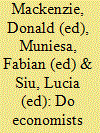

|
|
|
|
|
| Publication |
Princeton, Princeton University Press, 2007.
|
| Description |
ix, 373p.
|
| Standard Number |
9780691130163
|
|
|
|
|
|
|
|
|
|
|
|
Copies: C:1/I:0,R:0,Q:0
Circulation
| Accession# | Call# | Current Location | Status | Policy | Location |
| 053438 | 381/MAC 053438 | Main | On Shelf | General | |
|
|
|
|
| 18 |
ID:
141400
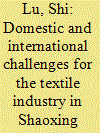

|
|
|
|
|
| Summary/Abstract |
This article recounts the transformations that have taken place in the textile industry in Shaoxing, Zhejiang Province, over the course of the past 30 years. It reveals the importance of the local setup and the links that have built up between companies, markets, and the state and its departments. It also exposes the difficulties experienced by companies as they try to adapt to their changing environment, whether in terms of opportunities offered by the domestic or international markets, or new regulations.
|
|
|
|
|
|
|
|
|
|
|
|
|
|
|
|
| 19 |
ID:
176859
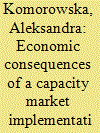

|
|
|
|
|
| Summary/Abstract |
This paper investigates the potential economic consequences of setting up a capacity market in Poland. A computable model of the Polish power generation system is developed and employed to analyse the impact of this mechanism. Two scenarios are designed for this study: (i) a reference scenario that reflects the energy-only market and (ii) a capacity market scenario that assumes the implementation of such an instrument. To assess the economic consequences, the following parameters are estimated: (i) annual electricity prices, (ii) Loss Of Load Hours, (iii) Expected Energy Not Served, and only for the capacity market scenario: (iv) market clearing price, (v) total budget of the capacity market, and (vi) increase in electricity price due to the introduction of the capacity market. The findings of the study indicate that the long-term maintenance of the energy-only market results in higher electricity prices when compared to putting a capacity market into operation. Introducing a capacity market enables existing resources to be used effectively without excessive capital expenditure. The methods and conclusions presented in this paper provide valuable findings and policy insights regarding the potential economic consequences of a capacity mechanism in a power system mostly dominated by coal and undergoing an energy transition.
|
|
|
|
|
|
|
|
|
|
|
|
|
|
|
|
| 20 |
ID:
106016
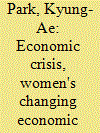

|
|
|
|
|
| Publication |
2011.
|
| Summary/Abstract |
Although many studies have analyzed the gendered impact of economic crisis, few have examined the case of North Korea. This article will explore how North Korea's economic crisis caused changes in women's economic participation. It will also analyze the impact of these new economic roles on the lives of women, and examine the broader implications of these roles for the status of women in North Korea. The North Korean economic crisis changed the pattern of women's economic participation, pulling women out of the formal labor market and driving them into the informal private economic sector. It also forced a number of women to leave their homeland in order to provide support for their own and their families' livelihoods. The new economic roles women have assumed in the wake of the food crisis have affected women's lives in many negative ways, resulting in an increase in their workloads, as well as an increase in the amount of sexual violence and stress of family breakdowns they experience. At the same time, however, these new roles have given women stronger voices in family decision-making matters and allowed them to develop, to some degree, a sense of self-consciousness and awareness of their own rights. Nevertheless, the fact that women have been engaged in new economic activities does not imply that they also have a high likelihood of advancing their socioeconomic status. To the contrary, women's defection from their homeland does not allow them to voice their opinions in matters related to the existing gender inequalities. Moreover, North Korean women are not considered capable of forming a critical mass, as they lack economic, social, political, and organizational resources to collectively voice their discontent. Furthermore, the neo-Confucian tradition of male superiority that is still firmly entrenched in the society is a major barrier that remains to be overcome.
|
|
|
|
|
|
|
|
|
|
|
|
|
|
|
|
|
|
|
|
|